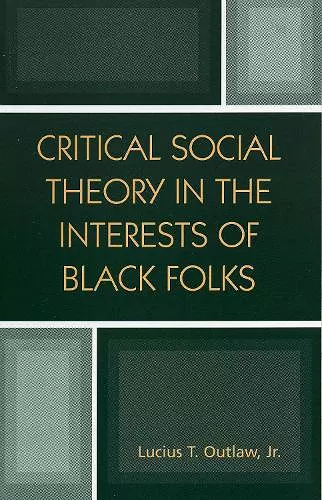Critical Social Theory in the Interests of Black Folks
Format:Paperback
Publisher:Rowman & Littlefield
Published:9th Sep '05
Currently unavailable, and unfortunately no date known when it will be back

Examining the situations of African Americans in the U.S.A., Lucius Outlaw's essays illustrate over twenty years of work dedicated to articulating a 'critical theory of society' that would account for issues and limiting-factors affecting African-descended peoples in the U.S. Attempting to put politics aside, Outlaw writes from a non-partisan standpoint, in the hopes that the issues he raises in his essays will inspire improvement for the well-bring of African Americans and will also strengthen America's democracy. Outlaw envisions a democratic order that is not built upon racist projections of the past. Instead, he seeks in these essays a transformative social theory that would help create a truly democratic social order.
Part memoir, historical tract, political manifesto, and reflection on academic philosophy and the "intellectual 'fix'," Lucius Outlaw's search for critical theory on behalf of black communities provides thought for our consideration. -- Joy James, editor, The New Abolitionists
This wonderful collection of essays is no less than a biography of and urgent call for critical theoretical explorations in the study of race in the last third of the twentieth century and these early moments of the New Millennium. Outlaw’s essays are well argued, informative, and, often, poignant. Here put together for the first time, these essays will no doubt stand among the classic exemplars of American critical reflection of its ongoing contradictions both of and in its ideals and its reality. -- Lewis R. Gordon, Professor of Philosophy and Africana Studies, University of Connecticut
This collection of essays written over two decades by one of our most prominent Black American philosophers offers a wealth of insight into the problems, as well as the rewards, of developing a critical theory that truly takes account of race while at the same time not neglecting the need for a new socioeconomic vision. Dr. Outlaw’s great familiarity with American history, including especially those parts of it concerning “Black Folk” that the standard textbooks still neglect, in combination with his clear-headed capacity for argumentation and his attractive willingness to be autobiographical and self-critical in the book’s Preface and Postscript, makes for a read that is both informative and enjoyable. -- William McBride, Department of Philosophy, Purdue University
ISBN: 9780742513440
Dimensions: 228mm x 148mm x 13mm
Weight: 313g
208 pages